The insurance industry’s sales engines are creaking under the weight of manual tasks, regulatory burdens, and rising customer expectations. Agents often spend more time on data entry, compliance checklists, and administrative follow‑ups than they do on selling.
In many firms, the average ramp-up time for new agents stretches into months, and inconsistent performance across teams is the norm. Customers, on the other hand, demand quick, individualized responses; if a potential customer calls at 10 a.m., waiting hours or even days for a callback may result in a missed opportunity.
Consider this: according to McKinsey, insurers adopting domain-level AI enhancements have achieved a 10–20% improvement in new-agent success rates and sales conversion rates.
McKinsey & Company at the same time, claims processing automation is reducing costs by 20–40%, and onboarding new customers is becoming significantly faster. McKinsey & Company adds to that the evidence that AI in insurance is projected to grow at a CAGR of 36.6%, hitting a market size north of $11 billion by 2028.
Yet, many insurance sales teams remain stuck in legacy modes: spreadsheets, manual QA, inconsistent handoffs, and lagging coaching. What did we get? Lost leads, frustrated agents, compliance risk exposures, and suboptimal customer experience.
In the next section, we dive into insurance sales automation: what it is, why traditional models are failing, the AI tech stack that's transforming debate into action, how Convin accelerates impact (with defined metrics), where it’s most effective across insurance use cases, and why leading carriers trust Convin to operationalize this future.
Automate, analyze, and accelerate your insurance growth with Convin.
What is Insurance Sales Automation?
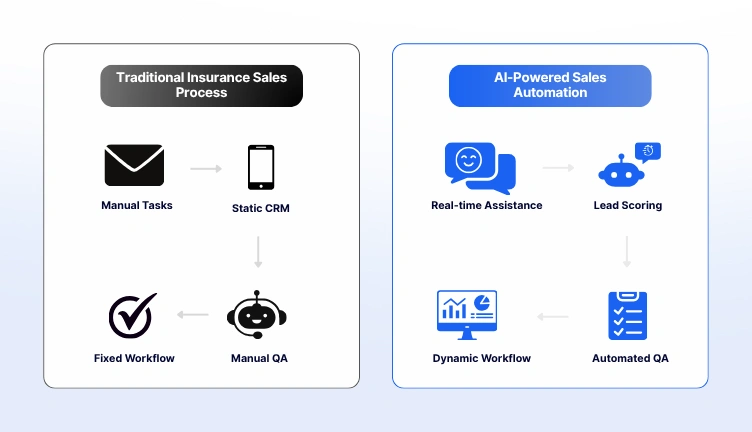
The use of technology, particularly artificial intelligence (AI), conversational analytics, real-time guidance, predictive scoring, automated quality assurance, and data dashboards, to optimize, enhance, and scale sales processes in insurance operations is known as insurance sales automation. Real-time agent guidance and decision-augmentation are more important than merely digitizing tasks, though that is a component.
Key elements include:
- Real-time sales assistance: Intelligent prompts, cues, or “battle cards” surfaced during calls to help agents respond quicker and more effectively.
- AI-powered lead scoring/qualification: Automated ranking of prospects based on likelihood to convert, risk profile, or next-best-actions.
- Call QA, compliance checks, and feedback loops: Automated monitoring of conversations for compliance adherence, conversational quality, and coaching signals.
- Behavior-based coaching and peer learning: Nudges or training recommendations driven by top-performer patterns.
- Role-based dashboards & analytics: Visualizing KPIs, conversion funnels, agent performance, and operational metrics.
Unlike traditional CRM automation (task reminders, pipeline stages), insurance sales automation is conversation-aware, AI-infused, and context-aware. It aims not just to remove friction but to amplify effectiveness at scale.
Experience real-time sales assistance built for insurance excellence.
Insurance Sales Automation: Why Traditional Models Are No Longer Sustainable
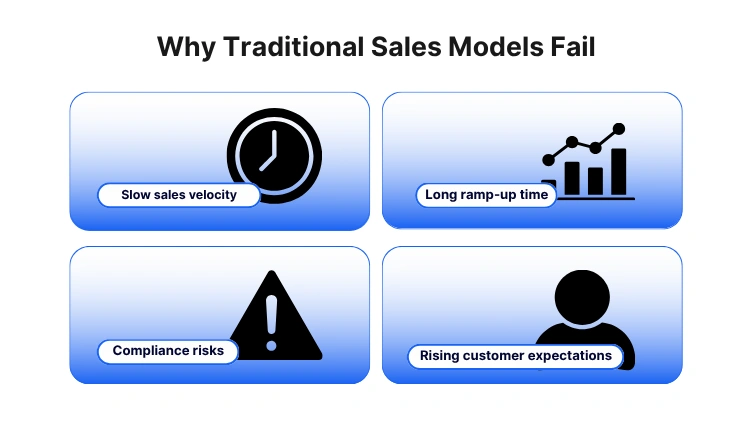
Traditional methods of selling insurance are becoming more and more fragile. The main issues undermining them are listed below, along with the reasons automation is now required.
- Manual processes are slowing down sales velocity
When agents manually enter data, update records, or search for documents mid-call, precious minutes slip away. Agents toggling between systems lose conversational momentum, causing leads to cool. In many organizations, only a small percentage of leads get follow-up within the optimal window.
Manual workflows also lead to bottlenecks: underwriting, compliance review, or quoting steps that require handoffs slow cycle times dramatically. In industry studies, automated claims processes have been shown to reduce processing times by up to 73%.
- High ramp-up time and poor agent productivity
New agents often struggle to internalize product knowledge, compliant phrasing, objection handling, and sales rhythms. In many insurers, ramp-up time may stretch 3–6 months before full productivity. That’s a heavy drag on ROI.
McKinsey reports that insurers applying AI interventions get 10–20% boosts in new agent success. McKinsey & Company Automation accelerates the learning curve by delivering real-time nudges and codifying top-performer behavior.
- Inconsistent sales conversations and compliance risks
Agent scripts and conversation styles vary in the absence of supervision or formal guidance. Some people undersell, while others overpromise. Even worse, noncompliance with regulations or sensitive wording can result in fines, damage to one's reputation, or audit exposure.
Automation helps by automatically flagging risky language, ensuring mandated disclosures, and enforcing QA rules. Indeed, AI-powered compliance checks in insurance allow near real-time monitoring and reduced risk.
- Rising customer expectations and demand for personalization
Modern buyers, conditioned by fintech and digital services, expect speed, context, and custom offers. If a prospect engages via chatbot or phone, they expect the agent to already know their profile, preferences, and prior interactions.
Here, legacy systems falter; agents use stale data, generalized scripts, and manual context-pulling. Insurance sales automation bridges the gap by surfacing contextual prompts, suggesting tailored offers, and ensuring continuity across channels.
Thus, to survive and scale, insurance firms must shift from reactive, manual processes to proactive, AI-enhanced workflows.
Turn every insurance lead into a high-value opportunity with Convin.
This blog is just the start.
Unlock the power of Convin’s AI with a live demo.

The AI-Driven Sales Tech Stack Transforming Insurance Teams
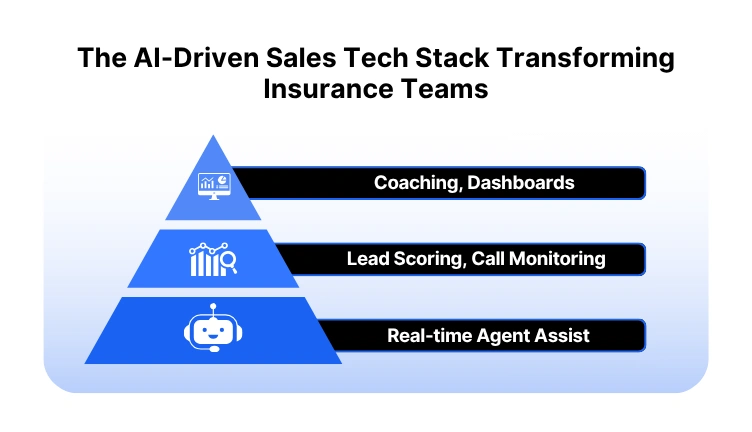
Modern insurance teams are embracing an AI-driven automation system that is redefining how they sell, engage, and serve. This new-age sales tech stack seamlessly integrates with existing systems, enhancing operational efficiency and helping insurers reduce operational expenses while improving outcomes across the board.
At its core, AI empowers data analysis and advanced analytics to drive smarter decision-making. From lead generation and lead qualification to policy issuance and policy renewal, AI tools automate and optimize sales workflows, freeing human agents to focus on high-value prospects and relationship building.
By automating routine tasks, deploying software bots, and leveraging predictive analytics, insurers can deliver faster service and more personalized interactions. AI not only handles customer queries but also strengthens customer engagement, ensuring every interaction is relevant, timely, and insightful.
This intelligent automation system also streamlines policy administration and adapts quickly to regulatory changes, ensuring compliance while maintaining agility. Through a strategic approach that minimizes errors, enhances accuracy, and elevates productivity, AI is transforming insurance operations into smarter, data-driven ecosystems, empowering teams to focus on innovation rather than repetition.
- Real-Time Agent Assist: Empowering Every Sales Conversation
At its core, real-time agent assist injects intelligence into live calls or interactions. As the agent speaks or listens, the system can:
- Surface relevant policy clauses, competitor differentiation, or objection rebuttals.
- Flag risky language or omissions (compliance check).
- Suggest next steps or scripts based on intent detection.
- Prompt cross-sell/upsell options dynamically.
These “contextual battle cards” close the gap between inexperienced and expert agents. According to automation trends in insurance, real-time lead scoring and dynamic quote generation are increasingly integrated into sales flows.
- AI-Powered Lead Scoring and Qualification
Not every lead is equal. In order to prioritize high-propensity leads, AI-driven lead scoring models rank prospects based on a variety of signals, including demographics, engagement, history, context, and channel source.
Advanced scoring models may also detect early signals of fraud, no-show risk, or underwriting complexity, enabling route optimization or conditional gating.
- Automated Call Monitoring, QA, and Compliance Reporting
One of the most resource-intensive tasks in traditional insurance is QA: manual call audits, compliance checks, and coaching feedback. AI changes that:
- Full coverage QA: Every call, not just the sampled few, is evaluated automatically against compliance and quality metrics.
- Red-flag triggering: The system flags calls with weaknesses (missed disclosure, unclear closing, adherence breakout).
- Automated scoring and trends: Aggregates scores per agent, per team, and surfaces common gaps.
- Regulatory alerts: Compliance modules detect deviations relative to jurisdictional rules.
This shifts QA from a retrospective audit function to an ongoing, proactive coaching engine.
- Personalized Coaching and Behavior-Based Feedback Loops
Beyond scoring, automation can generate prescriptive coaching:
- Suggest micro-actions (e.g., “You paused too long; try transition phrase X”).
- Surface call excerpts of top-performing agents with similar scenarios.
- Send nudges or bite-sized tips shortly after calls to reinforce learning.
This behavior-based feedback loop helps bridge individual gaps and replicate best practices across the team.
- Data-Driven Decision Making with Role-Based Dashboards
Executives, sales managers, compliance heads, and operations need visibility—but not overload. Dashboards tailored by role deliver:
- Conversion funnel metrics (leads → appointments → closures)
- Agent-level performance benchmarks
- Compliance breach analytics
- Sales cycle time distributions
- ROI per campaign, product line, or channel
Through the identification of bottlenecks, outliers, or new trends, these dashboards transform raw logs into actionable intelligence.
Real-time assistance, scoring, QA, coaching, and analytics are all woven into daily operations to increase productivity and scale consistency, and taken together, they make up a strong insurance sales automation stack.
Reimagine insurance automation with Convin’s intelligent tech stack.
How Convin Accelerates Automation in Insurance Sales
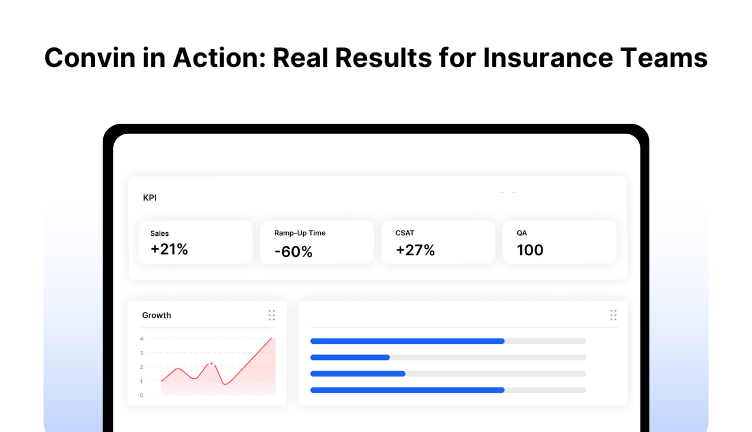
Convin's platform is designed to integrate AI with workflows for insurance sales. Here's how Convin produces significant results using relevant metrics.
- 21% Increase in Sales Performance: By enabling agents with real-time prompts, scripted nudges, and optimized next-best-steps, Convin clients have reported up to 21% lift in sales performance compared to baseline teams. These gains come from reducing conversational friction and enabling more confident, compliant conversations.
- 60% Decrease in Ramp-Up Time for New Agents: New agents onboard faster when they receive just-in-time help. Ramp time can be reduced by 60% with Convin's guided prompts, learning from best calls, and natural language insights, which lets new hires meet quota faster and save money.
- 100% Compliance Monitoring and Zero Manual Audits: Convin’s automated QA engine monitors all conversations against compliance rules, eliminating the need for manual audits. Compliance teams are alerted proactively, reducing risk, audit drag, and legal exposure.
- 27% CSAT Boost and Better Retention with Behavioral Insights: By analyzing customer sentiment, conversation quality, and agent behavior, Convin helps improve turn-by-turn experiences. Many clients have recorded a ~27% uplift in CSAT (customer satisfaction). Better experiences reduce churn and improve retention.
These figures translate into tangible ROI: lower operational costs, higher conversion, quicker ramp-up, and reduced compliance risk. Used in concert, they shift insurance sales from cost centers into agile revenue engines.
Insurance Use Cases That Benefit Most from Sales Automation
A variety of scenarios are involved in insurance operations, some of which are more susceptible to sales automation than others. Here are use cases where AI-powered automation yields a strong impact.
- Claims Management and Follow‑Ups
At sensitive times, claims departments frequently interact with policyholders to verify coverage, provide guidance for the next course of action, and negotiate a settlement. Automation can help:
- Agents get context cues during customer calls about policy bounds and comparable claims.
- QA ensures agents maintain compliant phrasing.
- Analytics identify claim types or agents with high call escalations, guiding training.
This produces faster claims resolution, higher satisfaction, and lower leakage.
- Cross‑Sell / Upsell of Insurance Products
One of the richest revenue opportunities is cross-selling complementary policies (e.g., bundling auto and home). Automation can deliver:
- Real-time promotions or product bundles based on customer profile.
- Nudges to agents to mention relevant add-ons mid-conversation.
- AI scoring to target customers most receptive to upselling.
This unlocks incremental revenue without extra acquisition costs.
- Lapsed Policy Recovery and Renewals
Recovering lapsed policies or renewing soon-to-expire ones is often tedious. Automation helps:
- Prioritize the list of lapsed customers by propensity to re-engage.
- Assist agents with personalized renewal scripts based on prior coverage history.
- Monitor utterances for friction triggers or objection heat zones during renewal calls.
This improves retention, reduces leakage, and stabilizes recurring revenue.
- Collections and Risk Mitigation
When policyholders delay payments, collection teams must negotiate. Automation aids by:
- Surface dispute resolution techniques or empathetic language.
- Monitor conversation tone and flag risky segments.
- Coach agents mid-call to diffuse conflict or upsell alternative plans.
Used properly, this reduces defaults and preserves relationships.
- Customer Onboarding and Consultation
New customers often require guidance in policy selection, comparison, and application. Automation can guide:
- Agents with dynamically generated FAQs, disclosures, and benefit comparisons.
- Real-time alerts if agents deviate from required scripts or regulatory checks.
- Suggest optimal policies based on profile data and predictive scoring.
This improves closure rates, reduces misquotes, and builds trust.
Each of these use cases demonstrates how insurance sales automation supports not just frontline selling but broader operational flows, risk control, and customer satisfaction.
Discover the AI system improving policy issuance and renewals.
Why Insurance Leaders Trust Convin for Sales Automation
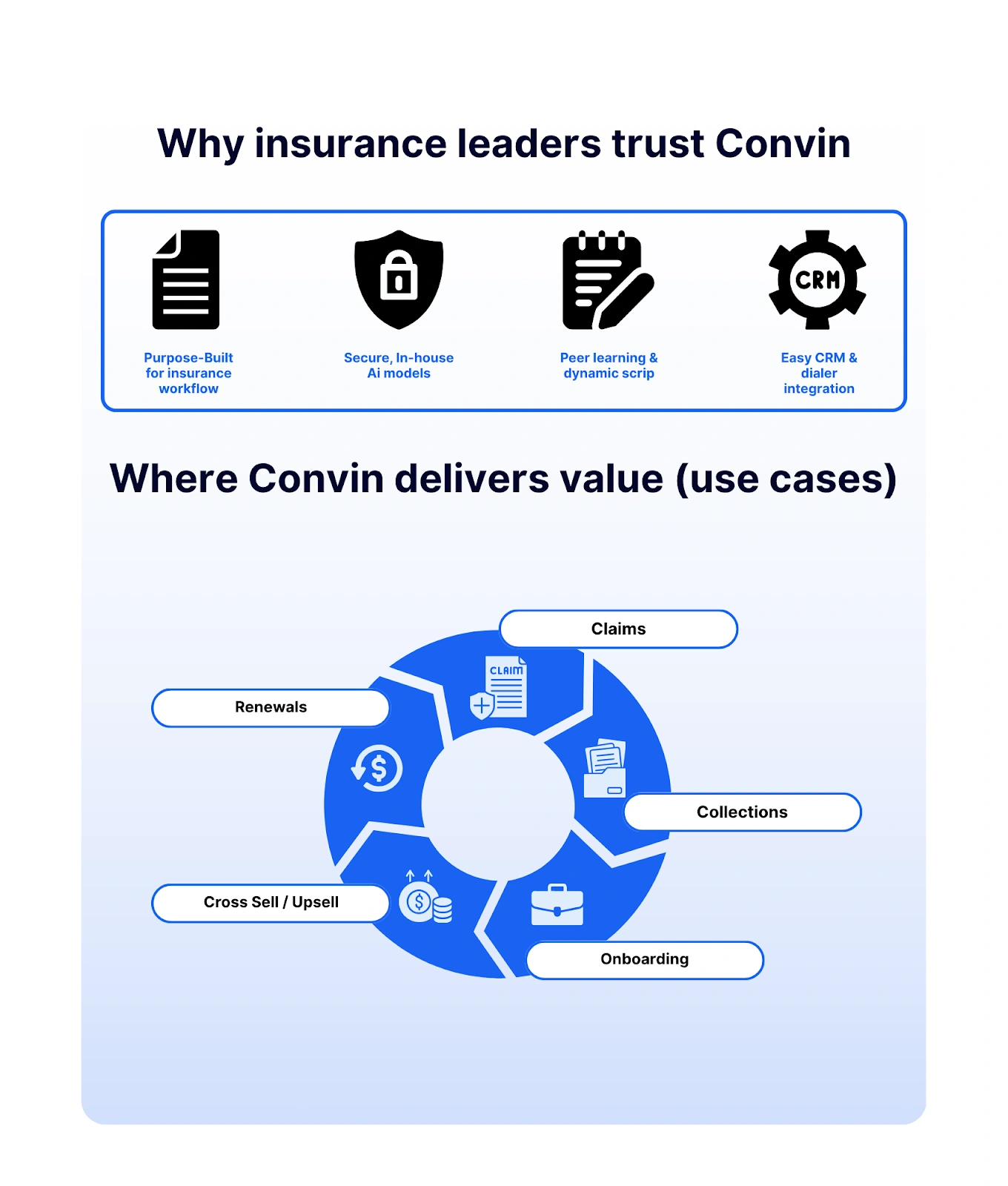
To drive adoption and maintain performance, Convin is built with several distinguishing advantages tailored for insurance.
- Purpose-built for insurance sales and support workflows
Convin's AI models and templates are tailored for insurance conversations, making it a unique conversational tool. That means pre-trained intents, policy templates, script templates, and domain lexicons optimized for insurance lines (life, health, and P&C).
- In-house models ensure secure, accurate transcription and insights
Rather than relying on black-box third-party models, Convin operates with in-house speech & NLP models. This offers:
- Enhanced accuracy on insurance vocabulary, accents, and domain context.
- Stronger data privacy and compliance: data doesn’t go to external APIs.
- Peer-to-peer learning and dynamic scripts for high-stakes conversations
Convin surfaces snippets from high-performing calls in similar contexts, enabling peer learning. Adapting in the middle of a conversation, dynamic scripting helps agents navigate objection flows, upsell pivots, and cross-sell routes.
- Integrates with existing dialers and CRMs effortlessly
To lower friction and promote adoption, Convin integrates with popular dialers and CRM systems. Data syncs automatically; agents don’t juggle multiple windows. The automation layer sits on top of existing infrastructure, not replacing it.
These features make it easier to deploy, scale, govern, and adopt Convin in large insurance organizations.
The Bottom Line
Automation of insurance sales is a vital tool for improving customer satisfaction, operational effectiveness, risk management, and revenue growth. In an environment that demands speed, compliance, and insight, legacy models are no longer scalable.
Performance improvements are made possible by the AI-driven stack, which includes dashboards, coaching loops, automated QA, smart lead scoring, and real-time support.
With quantifiable results, such as a 21% increase in sales, a 60% quicker ramp-up, 100% compliance coverage, and a 27% increase in customer satisfaction, Convin combines these capabilities and applies them to the insurance industry.
The use cases, which range from renewals to claims, demonstrate that automation isn't limited to a single silo but rather occurs throughout the life cycle.
Automation is now a must if you're a sales head or insurance leader dealing with sluggish growth, excessive expenses, or compliance pressure. Convin's insurance sales automation platform is designed to deliver on its promises.
All set to change your team?
Schedule a demo with Convin to discover how AI-powered insurance sales can help you gain a competitive edge.
FAQs
1. How are AI-powered insurance sales improving the insurance industry?
AI-powered insurance sales are revolutionizing insurance operations by automating lead management, streamlining insurance processes, and enhancing customer satisfaction through faster, more accurate interactions.
2. What role does real-time sales assistance play in insurance automation?
Real-time sales assistance helps agents make smarter decisions by using customer data and automated systems to personalize quotes, detect insurance fraud, and improve sales performance instantly.
3. How does AI automation reduce operational costs in insurance?
By automating repetitive tasks, data entry, and claims processing, AI-powered systems and robotic process automation help insurers reduce operational costs and achieve significant cost savings.
4. Can AI tools ensure regulatory compliance and risk assessment in insurance?
AI tools enhance risk assessment, monitor regulatory compliance, and detect anomalies, improving accuracy and trust across health insurance and other insurance tasks.
5. How does sales automation boost customer satisfaction in insurance?
Insurance automation ensures quick responses, accurate quotes, and efficient claims processing, resulting in higher customer satisfaction and smoother insurance operations.


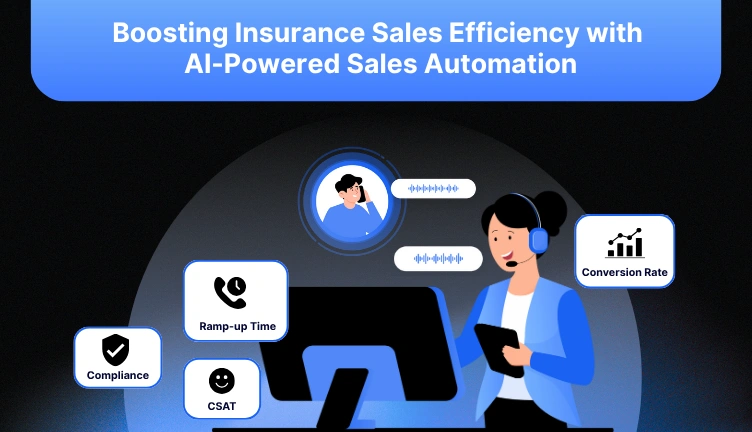
.avif)




.avif)